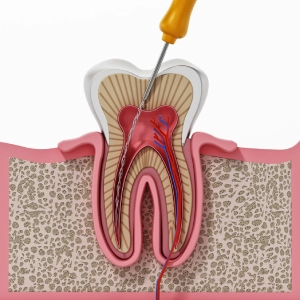Request Appointment
Kissimmee

New Patients Only: (407) 635-1196

All Other Callers: (407) 932-2273
Orlando

New Patients Only: (407) 606-7209

All Other Callers: (407) 601-4206
Saturday By Appointment
Call Us Now

What are the do's and don'ts after Root canal? A root canal procedure is an essential step toward preserving a severely damaged or infected tooth. However, proper care after the procedure is crucial for successful recovery and long-term oral health.
This blog will explore the do's and don'ts after getting a root canal. Whether you're dealing with discomfort or just want to keep your smile healthy, we've got some tips for you. Let's learn how to take care of your teeth after a root canal for a smooth recovery and good dental health.
A root canal is a dental procedure to treat bacterial infections in a tooth's pulp. The pulp in the tooth's inner chamber contains nerves and blood vessels. When bacteria invade the pulp, it causes inflammation and decay. A root canal is important to prevent the infection from spreading to your gums and jawbone, ultimately saving the tooth from destruction.

Before performing a root canal, the dentist examines the tooth and takes X-rays to assess the damage. In cases of severe damage where a root canal is not viable, tooth extraction may be recommended.
The dentist numbs the area during the procedure to prevent pain and discomfort. They then access the infected pulp by drilling into the decayed tooth. The dentist removes the entire infected tissue and cleans the root canals using small endodontic files. Although removing the pulp technically kills the tooth, it retains its strength and function.
After cleaning and disinfecting the tooth, it is filled to enhance strength and protection. Finally, the dentist seals the tooth with a temporary filling or restoration, allowing it to heal before placing permanent restorations.
After undergoing a root canal, you may experience minor side effects such as pain, swelling, and bleeding. Fortunately, these symptoms subside within a few days. To ensure a smooth recovery from your root canal procedure, it's important to follow these helpful tips:
Following the do's and don'ts after a root canal procedure is crucial for ensuring a smooth recovery and long-term success. By following these guidelines, you can lessen discomfort, lower the chances of complications, and support effective healing. Remember, your dental health is in your hands, so follow these recommendations diligently.
For complete dental care and expert advice on post-root canal treatment, come to Parkway Dental Care in Kissimmee, FL. Book an appointment online or call us at (407) 635-1196 if you're a new patient. Existing patients can reach us at (407) 932-2273. Your journey to achieving optimal dental health begins with us!
Your dentist says don't have hot drinks or chewy food until your mouth isn't numb. It's easy to hurt your mouth if you try to chew while it's still numb. Also, avoid sticky stuff like jellybeans and gum after your root canal.
You can start eating 30 to 45 minutes after a root canal. This gives your temporary filling enough time to fully harden. However, waiting until the anesthetic wears off before eating is best to avoid accidentally biting your cheek or tongue.
It's generally safe to drink cold liquids after a root canal. Cold drinks can help soothe any discomfort or swelling in the treated area. Just be mindful of not using a straw, as it could dislodge the temporary filling.
It's advisable to wait until the numbness from the anesthesia wears off before resuming normal activities. This usually takes a few hours. Avoid strenuous activities for the rest of the day to allow your body to recover properly.